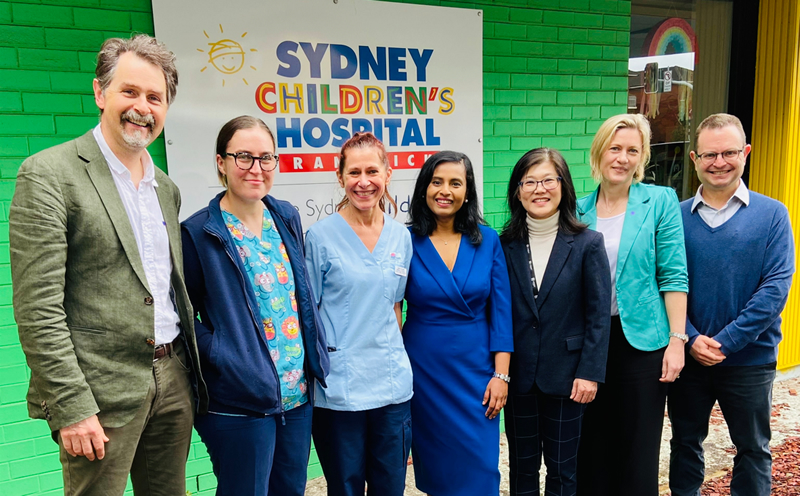A novel approach to diagnose cashew and pistachio allergy using peptide microarray technology
AIFA Food Allergy Research Grant 2022 - supported by DBV Technologies
Dr Brynn Wainstein
Other investigators: A/Prof Alice Lee, Dr Mahila Namasivayam and Dr Kylie-Ann Mallitt (UNSW), Dr Catherine (Katie) Frith, Dr Paul Gray and Ms Betina Altavilla (Sydney Children's Hospital)
Cashew allergy affects almost 3 in every 100 children in Australia, the same as the proportion of children affected by peanut allergy in our country. Cashew allergy causes more severe reactions than peanut including life threatening severe allergic reactions termed anaphylaxis, potentially resulting in death. Cashew nut allergy is typically life-long. Despite this, much is still not known about it, compared to peanut allergy which has been reported extensively.
Currently available tests used to diagnose cashew allergy have significant limitations and have not changed in over three decades.
The “gold standard” for diagnosing cashew allergy, the oral food challenge (OFC), has the potential to cause a life-threatening allergic reaction. It is a costly, time consuming and labour intensive test that needs to be conducted in specialised medical clinics, leading to limited access and long waiting lists across Australia.
Skin prick testing is more accessible but has an unacceptably high false positive rate when the history is unclear or is used as a screening tool.
The scarcity of information on cashew allergy and limitations with diagnosis causes considerable anxiety for affected families and places a burden on health care resources. This underscores the urgent need to develop accurate diagnostic methods for cashew allergy.
Peptide microarray technology can be applied innovatively to diagnose food allergy. It is minimally invasive and has diagnosed peanut allergy and severity almost as accurately as an OFC without the risk of a life-threatening reaction.
The benefit of the study is illustrated through Hamish's story. Hamish is a teenage boy who was diagnosed with cashew allergy at 10 months of age. He tested positive to all other tree nuts as well. His mother, Teresa, recalled that “It felt like a life sentence at the time. We had no idea about the severity of his cashew allergy.”
Over time, Hamish passed oral food challenges to all tree nuts except to cashew. He even passed his pistachio nut challenge even though it is closely related to cashew nut and he had a positive pistachio allergy test. The family were keen to proceed with a cashew challenge this year. It had been almost 14 years since Hamish last ate cashew. The skin prick test suggested that it would be okay to try the cashew challenge.
Hamish developed anaphylaxis (a life threatening severe allergic reaction) to cashew during the oral food challenge and required treatment with adrenaline.
“It was a long day. It was difficult to get him to eat the food he had been told to avoid all his life. Then he became very sick. As a mother it was an eye opener and I learnt a lot. But I could see that it was really scary for Hamish.
Having more data to make the decision before proceeding with a food challenge would be very helpful, the more the better. It is good information to have before putting them through that. Especially for mental health. We hope that this new blood test will give us more information than a skin prick test, about whether the cashew allergy is still there and if it is severe.”
We are very thankful to Hamish and his mother, Teresa, for sharing their story with us. Hamish was our first recruit to the study.
Peptide microarray technology hasn’t been studied in Australia for diagnosing cashew nut or other clinical food allergy. Cashew and pistachio nuts are from the same botanical family. This study plans to be the first to use peptide microarray testing in Australian children to study immediate allergy to cashew and pistachio nuts.
Research Group

From left to right:
Dr Paul Gray - Joint Head of Department, Immunology and Infectious Diseases, Sydney Children's Hospital. Paediatric Immunologist and Allergist.
Ms Abigail Bates - Allergy Nurse.
Ms Betina Altavilla - Allergy Clinical Nurse Consultant.
Dr Mahila Namasivayam - Paediatric immunologist and Allergist.
A/Prof Alice Lee - Food and Allergy Research Leader, University of New South Wales.
Dr Catherine (Katie) Frith - Paediatric Immunologist and Allergist.
Dr Brynn Wainstein - Paediatric Immunologist and Allergist.
AIFA Food Allergy Research Grant of $15,000 (supported by DBV Technologies)


